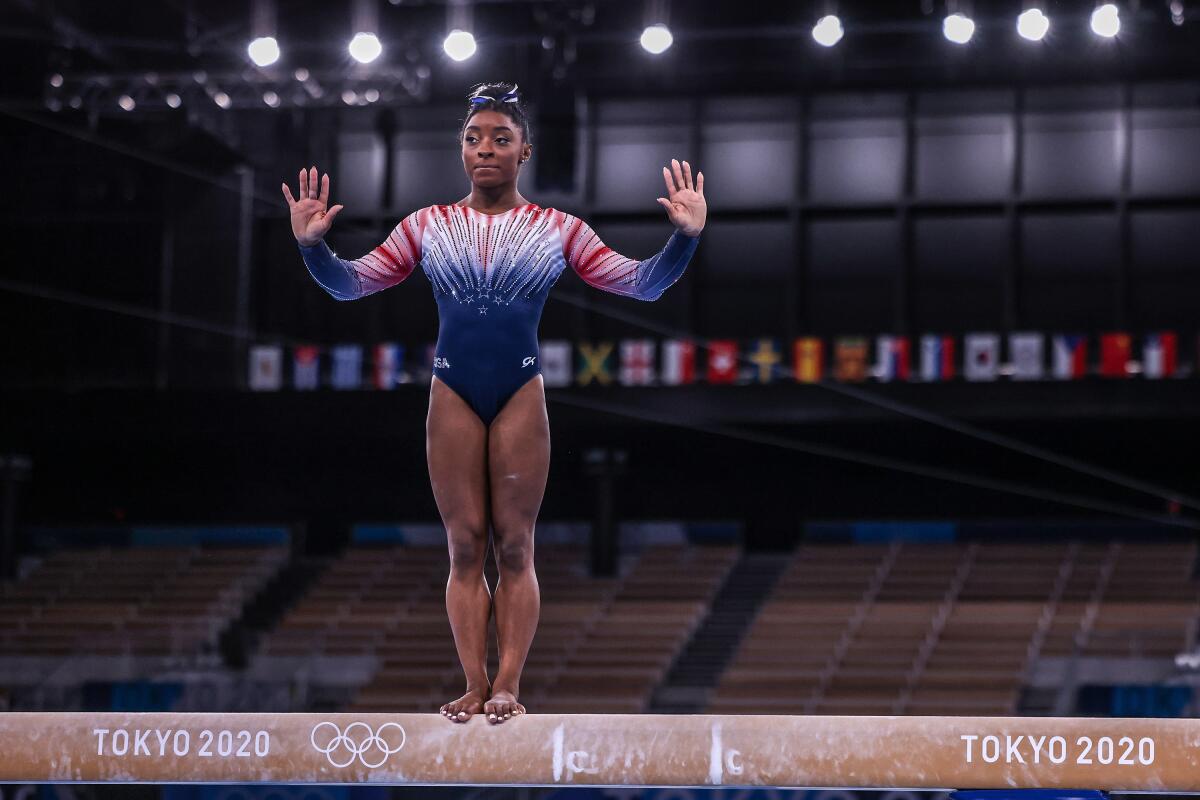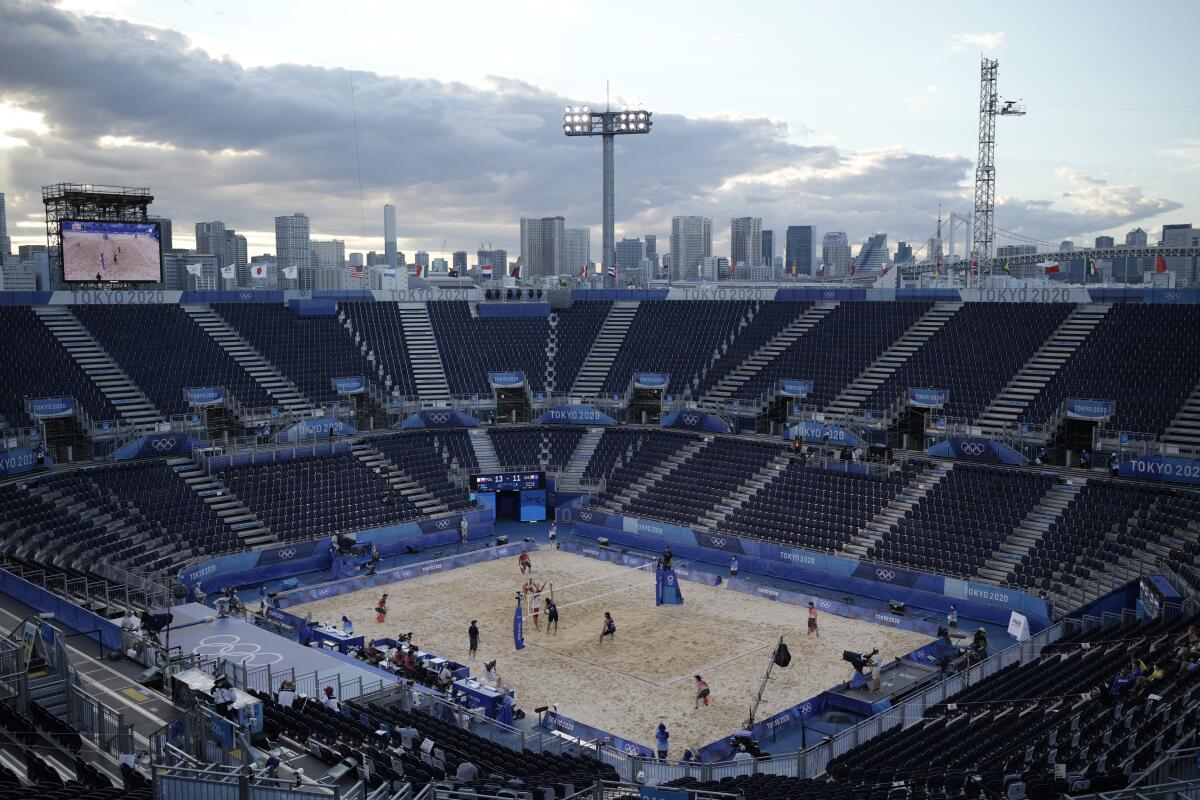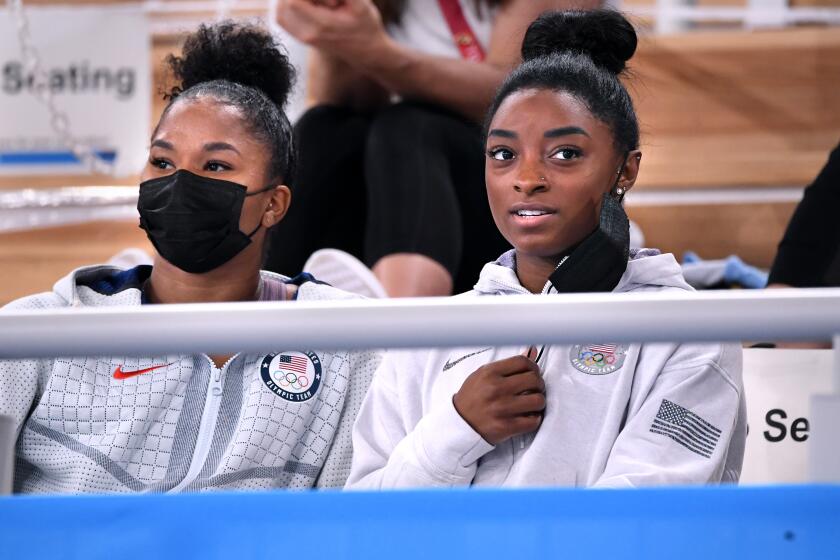Tokyo Olympics a courageous effort amid pandemic but ultimately underwhelming

- Share via
TOKYO — The most anticipated athletic performance of these Olympics became a metaphor for the Games themselves.
Days after Simone Biles dropped out of the gymnastics team final because she suddenly lost the ability to figure out where she was when twisting in the air, she returned for the individual balance beam.
Biles made it through her routine. She won a bronze medal. She did well enough for her supporters to be able to convince themselves she was victorious in defeat, but the story’s brief shelf life in the aftermath of the competition pointed to an alternate, and more accurate, reality.
While courageous, her performance was underwhelming.
Simone Biles did the right thing by not competing when she believed she couldn’t. But it also tarnishes her legacy as a gymnast.
Similar feelings were evoked by these Olympics, which were staged against the backdrop of a global pandemic. The host city of Tokyo was under a state of emergency and the majority of Japan didn’t want the Games to happen.
The Pandemic Games produced some special moments, including Japan’s triumphs in judo that temporarily captivated the country as well as the 400-meter races in men’s and women’s track and field that were won in world-record times. Although the ultimate cost of these Olympics will be determined in the coming weeks by the number of reported COVID-19 infections, disaster was averted while the Games were in progress.
However, even when graded on the most lenient of curves, they disappointed.
These Olympics were joyless. In most parts of Tokyo, there were few, if any, signs of the Games being in town. And why would there be?
There were no foreign tourists to fuel the local economy, none of that warmth that comes when people from various parts of the world share drinks and unite under something as trivial as sports.

The locals were kept out of almost every Olympic venue, with some blockades extending into the surrounding neighborhoods. Some of these sites were expansive. For example, the beach volleyball stadium was placed in Shiokaze Park, which is nearly 40 acres and was entirely closed to the public. Many of the 80,000 volunteers stood around or roamed places like this with nothing to do.
The Games were here, but they weren’t. By the time they started, their purpose wasn’t to enhance Japan’s international reputation or tourism industry, but to ensure the country wouldn’t lose any more money than it already had. Those aren’t the motives behind a successful event.
The on-field competitions failed to blow away the stench of cynicism. Outside of the baseball team that won a gold medal, Japan’s most popular athletes and teams missed the podium. Interest levels varied, as athletes weren’t hyped up for months, as is the customary practice here. Media outlets didn’t want to appear as if they were endorsing an unpopular event.
In other words, there were no stars.
The U.S. had Biles, Megan Rapinoe and Kevin Durant, and that was about it. Biles and Rapinoe didn’t win. Durant won a competition in which a U.S. victory was considered a given. The Games were a reminder of how the world has changed, how transcendent fame is virtually unattainable for non-gymnast athletes who compete in sports that are ignored in non-Olympic years.
Under such conditions, no athletic display of the human spirit ever had a chance of washing over the cynicism associated with these Games.
Biles’ candor about mental health has contributed to an important dialogue about the burdens athletes are expected to shoulder. Perhaps a day will come when athletes aren’t judged on a binary scale of wins and losses, and Biles’ bronze medal in the balance beam will be appreciated as much as if it were gold.
The value of these Olympics will also be judged on the change they can impart — specifically, what organizers can do the next time a major international sporting event is threatened by a pandemic. Multiple postponements, which the IOC didn’t want, must be on the table.
Until then, memories of these Games will elicit feelings of disappointment, that they were something less than they should have been.
More to Read
Go beyond the scoreboard
Get the latest on L.A.'s teams in the daily Sports Report newsletter.
You may occasionally receive promotional content from the Los Angeles Times.









